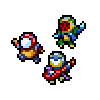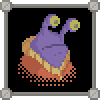 |
Castle Paradox
|
| View previous topic :: View next topic |
| Author |
Message |
msw188
Joined: 02 Jul 2003
Posts: 1041
|
 Posted: Thu Aug 17, 2006 11:14 am Post subject: Luck Posted: Thu Aug 17, 2006 11:14 am Post subject: Luck |
 |
|
How much effect should sheer luck have on the player? Or put another way, how much should random choices of the computer be allowed to dominate gameplay?
I seem to remember that in the Dragon Warrior series, if you got unlucky enough at the right moment, almost all the level-busting in the world would not have been enough to have gotten you through. I'm talking especially about spells like Sleep that could potentially neutralize your entire party, or later Beat and Defeat. On the other hand, I very rarely felt like luck had much effect in the later Squaresoft games (SNES and on), which might be what made them feel easier. They felt more fair, or at least they made battles feel more manageable, rarely feeling like the battle had been taken out of the player's control.
So the question is: Should proper planning and preparation be enough to get you through anything, or should some random number-crunching occasionally be able to beat the odds? I'll wait for some replies before giving my thoughts (although some may be able to guess already).
EDIT: fixed a typo |
|
| Back to top |
|
 |
TwinHamster
♫ Furious souls, burn eternally! ♫

Joined: 07 Mar 2004
Posts: 1352
|
 Posted: Thu Aug 17, 2006 11:20 am Post subject: Posted: Thu Aug 17, 2006 11:20 am Post subject: |
 |
|
I tried an experiment with this form of randomness in gameplay, but it was considered a failure, because nobody wanted the game to decide the fate of any battle.
I personally think that the occasional input of random luck would be a good feature.
[edit]:
However, when it comes to random status inducing attacks, then I believe that you do have to rely on some skill to recover to win.
Besides the usual "If-you-get-hit-really-really-hard-then-use-CUR3" type of plan, I can't think of any game where I had to spend time preparing for a way to defeat an enemy. |
|
| Back to top |
|
 |
Moogle1
Scourge of the Seas
Halloween 2006 Creativity Winner


Joined: 15 Jul 2004
Posts: 3377
Location: Seattle, WA
|
 Posted: Thu Aug 17, 2006 11:55 am Post subject: Posted: Thu Aug 17, 2006 11:55 am Post subject: |
 |
|
Iblis LJed what might as well be the definitive treatise on the subject. Rather than reword his sentiments, I'll link here.
http://nebulousbee.livejournal.com/29431.html
(Skip to the third paragraph unless you want to hear about Cave Story.)
_________________
|
|
| Back to top |
|
 |
Bob the Hamster
OHRRPGCE Developer

Joined: 22 Feb 2003
Posts: 2526
Location: Hamster Republic (Southern California Enclave)
|
 Posted: Thu Aug 17, 2006 12:28 pm Post subject: Posted: Thu Aug 17, 2006 12:28 pm Post subject: |
 |
|
I have always thought that Battle for Wesnoth was a really cool game, but unfortunately it suffers rather severely from a surplus of randomness.
Your units gain experience, and you can take them with you from campaign to campaign, but even a fully level-up unit often meets with a quick death when faced with weak foes on an unlucky turn.
Randomness can be important in a game-- but you don't want so much of it that it obliterates any strategy you might make. |
|
| Back to top |
|
 |
JSH357

Joined: 02 Feb 2003
Posts: 1705
|
 Posted: Thu Aug 17, 2006 1:08 pm Post subject: Posted: Thu Aug 17, 2006 1:08 pm Post subject: |
 |
|
I like things being luck-oriented, but it needs to be controlled to some degree. FFT evasion, for instance, is extremely random and annoying. Pokémon relies WAY too much on luck. A critical hit practically wins the battle for you.
Fire Emblem handles random numbers very well. Level-ups are randomized, so you're encouraged to use different characters on each playthrough. On the flip side, you have to pay attention to where you move units, so you have some degree of control over the RNG. |
|
| Back to top |
|
 |
Iblis
Ghost Cat

Joined: 26 May 2003
Posts: 1233
Location: Your brain
|
 Posted: Thu Aug 17, 2006 3:32 pm Post subject: Posted: Thu Aug 17, 2006 3:32 pm Post subject: |
 |
|
As the link suggested, I don't see how luck brings anything to a game. It takes control away from both the game designer and the player.
That said, probability can be useful. For an example, think of how in RPG battles the game determines whether you hit or miss. Generally this is calculated using the attacker's aim stat and the enemy's evade stat, and some use of random numbers. While this does use randomness, it can also be predicted and controlled. Predicted if you know who has high/low accuracy and who has high/low evade, and controlled if you have attacks that can manipulate these stats.
If you're just going by numerical statistics, a hit/miss function requires some kind of randomness. Otherwise you could end up with characters that can't hit ever, and that just doesn't work. However, you could certainly come up with some system for using player skill to determine hit or miss, and while this is much more difficult it is potentially very interesting. It's also possible though to eliminate the concept of missing altogether, which I think is a valid way to go.
_________________
Locked
OHR Piano |
|
| Back to top |
|
 |
Jack
the fool

Joined: 30 Jul 2004
Posts: 773
|
 Posted: Thu Aug 17, 2006 5:20 pm Post subject: Posted: Thu Aug 17, 2006 5:20 pm Post subject: |
 |
|
Usually, well in most games I've played, luck affects more than just battle. Such as encounters, items/gold found. Luck isn't exactly necessary, but there are instances in which it can be used.
_________________
 |
|
| Back to top |
|
 |
Mr B
Joined: 20 Mar 2003
Posts: 382
|
 Posted: Mon Aug 21, 2006 10:23 am Post subject: Posted: Mon Aug 21, 2006 10:23 am Post subject: |
 |
|
Really, it seems to boil down to a balance of determinism and non-determinism.
Would we want to play a game that was (from the point-of-view of the gamer) deterministic? Knowing the exact order of events and consequences of each player action would be boring and unstimulating.
However, having a completely non-deterministic game would be infuriating, simply because the consequences of a player action would never be predictable and the game would posess no gameplay (a game can posess no gameplay just as a variable can contain a null value...I think..?).
I think that a game should possess sufficient unpredictability that the consequences of a player action would not be entirely predictable, but should also possess sufficient predictability such that the possible consequences of a player action compose a useful set.
That is, the specific consequence should be unpredictable, but the general trend should be understandable. |
|
| Back to top |
|
 |
Iblis
Ghost Cat

Joined: 26 May 2003
Posts: 1233
Location: Your brain
|
 Posted: Mon Aug 21, 2006 5:06 pm Post subject: Posted: Mon Aug 21, 2006 5:06 pm Post subject: |
 |
|
Determinism and predictability are two absolutely separate things.
All computer games are deterministic, really. Normal computers are totally incapable of actual randomness, they just use a complicated process to generate what seem to be random numbers. And to a human, they are random. That a game is deterministic does not necessarily make it predictable. No human is going to figure out the random number generator and always be aware of how its output is used by the game. What makes a game predictable or not is whether its processes give the player sufficient feedback and are simple enough for the player to understand.
Introducing randomness (luck) into a system is just a way to artificially create the appearance of complexity. It's just the easy way out for programmers. And that's okay sometimes! I mentioned in that LJ post that I vary damage randomly, in a pretty small range, simply for visual interest. I could design an amazingly complex system that would take a million factors into account and generate similar results. But it just isn't that important, dedicating that much time and code to such a simple feature would be senseless, as it has very little effect on gameplay.
But what if I'm designing, say, the enemy's AI? I could use randomness here too, to make it seem more complicated. Or I could make a truly complicated system that would make a foe that is more rational and thus simultaneously more difficult and more predictable. It could take into account obvious factors, such as reacting to members of its party being hurt and healing them, or being asleep and waking them up. And the player would be able to use this predictability. But it would also take into account factors that are not obvious to the player at all. Perhaps, though, a player would be able to figure some of them out after having enough experience with it.
So, it's good to surprise the player with a cunning move from the AI. Hell, if you can do that, that's extremely great. But the cunning move needs to come from a rational decision, not from a random number generator, or else your AI is just as likely to make a completely stupid move for no reason. A player can strategize against a rational AI, even if they don't know what the AI is going to do every time.
_________________
Locked
OHR Piano |
|
| Back to top |
|
 |
Mr B
Joined: 20 Mar 2003
Posts: 382
|
 Posted: Tue Aug 22, 2006 11:21 am Post subject: Posted: Tue Aug 22, 2006 11:21 am Post subject: |
 |
|
| Iblis wrote: | | All computer games are deterministic, really. |
Er, well, of course. I meant more of a "Bob-off-the-street" determinism, where the deterministic aspects are obvious to a casual observer (or not obvious, depending). |
|
| Back to top |
|
 |
Moogle1
Scourge of the Seas
Halloween 2006 Creativity Winner


Joined: 15 Jul 2004
Posts: 3377
Location: Seattle, WA
|
 Posted: Tue Aug 22, 2006 1:36 pm Post subject: Posted: Tue Aug 22, 2006 1:36 pm Post subject: |
 |
|
Hmm... strict determinism can be a good thing, though. In fact, most early video games were highly or totally deterministic. The trick here is that determinism still surprises the player the first time around. As an easy example, consider Super Mario Bros. The only really random behaviors in the game come from Hammer Brothers and King Koopas (including their fireballs). Everything else is purely reactive to player behavior. In other words, determinism is predictability only when the player is fully informed. Determinism can still be surprising to an underinformed player.
Even modern games can be completely deterministic. Rhythm games like DDR, Parappa, or Guitar Hero are exactly the same every time you play. It is entirely possible, in my estimation, to make a strictly deterministic RPG along the same lines. (The only real requirement for strict determinism is that you never attempt to generate a random or semirandom number: everything in the game should be decided by conditions of the game itself and not by non-game factors like the CPU timer.)
Whether this is an improvement is a completely different argument. I contend that it is not per se, but can be used effectively, like any other game design decision. Except in tactical games where it really makes a difference, I like not knowing *exactly* how much damage I'm going to do with each attack, like Iblis mentioned, though this is almost universally cosmetic, having no impact on gameplay.
_________________
|
|
| Back to top |
|
 |
Iblis
Ghost Cat

Joined: 26 May 2003
Posts: 1233
Location: Your brain
|
 Posted: Tue Aug 22, 2006 1:58 pm Post subject: Posted: Tue Aug 22, 2006 1:58 pm Post subject: |
 |
|
| Quote: | | I like not knowing *exactly* how much damage I'm going to do with each attack, like Iblis mentioned, though this is almost universally cosmetic, having no impact on gameplay. |
This is unrelated to your point, but what you said made me think of FFT. It told you how much damage an attack was going to do, and how likely it was to hit, before you used it. And I remember, I'd select different targets to see who I could damage the most and who I was likely to hit. Sometimes the numbers would be off (usually with axes, if I remember correctly), but it seemed to be accurate almost all of the time. Seems like a good way to better inform the player's decisions.
_________________
Locked
OHR Piano |
|
| Back to top |
|
 |
Bob the Hamster
OHRRPGCE Developer

Joined: 22 Feb 2003
Posts: 2526
Location: Hamster Republic (Southern California Enclave)
|
 Posted: Tue Aug 22, 2006 3:27 pm Post subject: Posted: Tue Aug 22, 2006 3:27 pm Post subject: |
 |
|
| Moogle1 wrote: | | ... It is entirely possible, in my estimation, to make a strictly deterministic RPG along the same lines. (The only real requirement for strict determinism is that you never attempt to generate a random or semirandom number: everything in the game should be decided by conditions of the game itself and not by non-game factors like the CPU timer.) |
That sounds cool. I will give a cookie* to the person who does this in the OHRRPGCE
*Cookie might not be delicious, edible, or even non-virtual |
|
| Back to top |
|
 |
Moogle1
Scourge of the Seas
Halloween 2006 Creativity Winner


Joined: 15 Jul 2004
Posts: 3377
Location: Seattle, WA
|
 Posted: Wed Aug 23, 2006 9:19 am Post subject: Posted: Wed Aug 23, 2006 9:19 am Post subject: |
 |
|
| Oh, it's tempting. |
|
| Back to top |
|
 |
Mr B
Joined: 20 Mar 2003
Posts: 382
|
 Posted: Wed Aug 23, 2006 1:25 pm Post subject: Posted: Wed Aug 23, 2006 1:25 pm Post subject: |
 |
|
One thing I've been itching to do is a game where damage is calculated before it happens (apparently as in the FFT reference), so that characters can behave "in anticipation" of the attack.
For example, if Dent is assigned to attack a Plutonium Blob, the engine will calculate the damage before any animation occurs. If the damage is such that the Blob will die, Dent can yell "You're going down!", then make the final, killing move.
Or, perhaps, the attack was calculated to be a miss, in which case another character with whom Dent is antagonistic could shout "Look behind you!", "causing" Dent to miss.
I dunno. It wouldn't do much, but it could be fun to bring more characterness to the battle-field. |
|
| Back to top |
|
 |
|
|
You cannot post new topics in this forum
You cannot reply to topics in this forum
You cannot edit your posts in this forum
You cannot delete your posts in this forum
You cannot vote in polls in this forum
|
Powered by phpBB © 2001, 2005 phpBB Group
|



